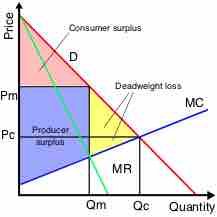Protectionist policies are a highly charged topic in economic debates, as economies work to attain the optimal balance of free trade and trade protectionism to capture the most value. In many ways, the global markets are torn between pursuing what is best on the global level and what is best at the domestic level, and there is sometimes dissonance between the two. One of the strongest arguments for some degree of trade protectionism is the tendency for unfair competition to emerge, particularly in developing markets without the infrastructure to monitor their businesses and enforce penalties. This is called the unfair competition argument.
Dumping
A popular recent topic is anti-dumping policies directed at international players looking to undercut domestic business through selling at dramatically reduced prices. This can be a substantial threat, particularly from economies where labor laws are lax and workers are exploited to create extremely low cost goods. This is also a risk when governments get too involved in business, a criticism often pointed out in China. Governments can provide subsidies to reduce costs for domestic companies. This can also be a threat in infant industries, where larger and more established players can push out smaller players via undercutting prices, absorbing losses until the competition goes bankrupt.
Offsetting this threat has been an ongoing struggle, with the emergence of international trade agreements and organizations like the World Trade Organization (WTO) playing an increasingly large role. One of the struggles with international trade is the difficulty of enforcement between nations, and the WTO plays a critical role in identifying malpractice and addressing it.
Intellectual Property
Another critical risk in the global market is intellectual property (IP) protection. Patents, in a domestic system, protect the innovator to allow them to generate returns on the substantial time investment required to invent or innovate new products or technologies. On a global scale, however, it is quite common for developing nations to copy new technologies via reverse engineering. This results in copycats violating the patents in an environment where the infrastructure domestically will probably not take legal action. This reduces the desire for innovation and places large economic risks on countries dependent upon this for growth.
This is addressed through international patent laws and trade agreements as well, alongside political pressures such as raising tariffs and placing import quotas on countries suspected to be in violation of patents. The downside to this is that utilizing these measures creates political unrest, global factions, and strained business relationships.
Mergers, Acquisitions, and Market Dominance
Another unfair competition threat is the emergence of global monopolies. Some of the larger ones attain enough global power and geographic diversification to be difficult to break up via domestic antitrust laws. demonstrates the substantial threat of deadweight losses being incurred in economies where consolidation results in a lack of competitive forces to drive down price.

Economic Losses in a Monopoly
This chart highlights the very real risk of lost economic value in a monopolistic situation (deadweight loss in yellow).
On the domestic level monopolies are widely seen as being addressed (though this is hotly debated by many economists in light of the 'too big to fail' and 'too big to jail' banks). On a global scale it is even more difficult to regulate, as the size and scale of these companies often extends beyond the power of the governments where these companies are located. This is addressed through international standards and trade agreements, standardizing governmental policy on a global level to reduce the risk of monopoly and unfair consolidation towards market dominance.